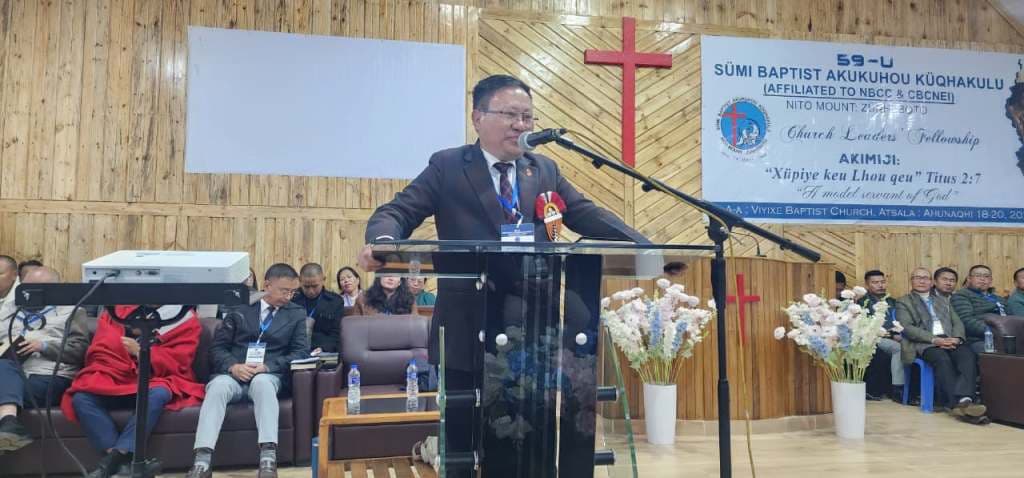TUESDAY, NOVEMBER 18, 2025
- Home
- Y Kikheto Sema urges churches to practise prudent financial management
Y Kikheto Sema urges churches to practise prudent financial management
Y Kikheto Sema addressed the Sumi Baptist Akukuhou Kuqhakulu's 59th Church Leadership Fellowship, urging prudent financial management.
Share

DIMAPUR — Y Kikheto Sema, principal secretary to the Government of Nagaland, was the special invitee at the inaugural session of the 59th Church Leadership Fellowship under Sumi Baptist Akukuhou Kuqhakulu (SBAK) Nito Mount, which got underway on Tuesday.
According to an update, the fellowship is being held at Viyixe Baptist Church from November 18 to the 20th, centred on the theme “A model servant of God”.
Addressing church leaders from across the region at the inaugural service, Kikheto recalled participating as a resource person in 1991 at Phuye Old under the then-undivided SBAK, when he was a young officer.
He shared how, even then, he urged churches to practise prudent financial management while warning of challenges that he believed were looming ahead. He noted that many of the concerns he foresaw 34 years ago have now become a visible reality and urged church leaders to take timely corrective measures.
Also read: Rengma Hoho mourns passing of former minister Dr. Khasü Kath
Kikheto cautioned against the growing perception that God belongs to specific churches or associations. He explained that such thinking risks fostering spiritual exclusivity and discrimination among Christians. As an example of cross-denominational contribution, he acknowledged the significant role of Catholic Salesians in providing quality education to Nagas, while also recognising Baptist missionaries for laying the foundational educational framework in the state.
Kikheto emphasised the need for mega churches in Kohima, Dimapur, district headquarters, and sub-divisions to extend greater support to weaker and rural churches. Highlighting the deteriorating condition of many rural school buildings, dispensaries, and health centre facilities used daily by the public, he urged churches to respond compassionately and practically.
According to him, the combined tithes, offerings, and donations received by some large churches surpass the budgets of several government departments, putting them in a unique position to contribute meaningfully to community welfare.
Drawing from his experience as former principal secretary of Health and Family Welfare, he expressed deep concern over the rising use of drugs among young people. He encouraged churches to intensify preventive and rehabilitative efforts, noting that moral guidance alone is no longer sufficient; rather, the church must actively engage with affected individuals and communities.
In this context, he advised churches to reconsider heavy investments in commercial assets and instead prioritise the establishment of rehabilitation centres that could provide tangible support to those struggling with addiction.
Addressing financial priorities, Kikheto pointed out the significant expenditure by many churches on vehicle purchases, estimating that in Sema-inhabited areas alone, nearly 500 vehicles have been registered under various churches, amounting to a combined cost of around INR 50 crore. While acknowledging that change is inevitable with time, he questioned whether such investments align with the core mission of the church.
The principal secretary further spoke on the Clean Election Movement, strongly advocated by church bodies across Nagaland. Despite this, he lamented that the 2023 state elections saw an estimated INR 1,281 crore spent by 183 candidates, raising the question of whether the movement is upheld only during election seasons. He urged churches to embed the principles of clean elections into their year-round teachings and practices.
Continuing his critique of resource management, Kikheto expressed concern over the large-scale expenditures incurred during church conferences. With annual conferences, theological gatherings, area fellowships, and various age-group camps occurring each year, he encouraged churches to evaluate the necessity, frequency, and scale of such events and ensure that their resources are used wisely.
Reflecting on environmental stewardship, Kikheto recalled a resolution adopted during the 74th Nagaland Baptist Church Council (NBCC) Annual Conference at his native village Rotomi, which called for the protection of flora and fauna and banned the use of wild animals as gifts. He urged leaders to uphold the resolution sincerely and set an example of responsible stewardship.
Turning to financial practices within churches, he reminded the gathering of the 2005 Money Lending Act, which limits interest rates to 3% per annum above existing bank rates. He noted with concern that many churches continue to borrow from private lenders at 50% up to 100 % per annum, far exceeding legal limits and placing congregations at financial risk. He encouraged churches to instead explore legitimate loan options through banks, where interest rates and borrowing terms are regulated and lawful.
Also, Kikheto expressed unease over the rapid increase in theological degrees, such as M.th., doctorates among church leaders, questioning whether this trend is contributing meaningfully to spiritual growth and the wellbeing of the church community.

